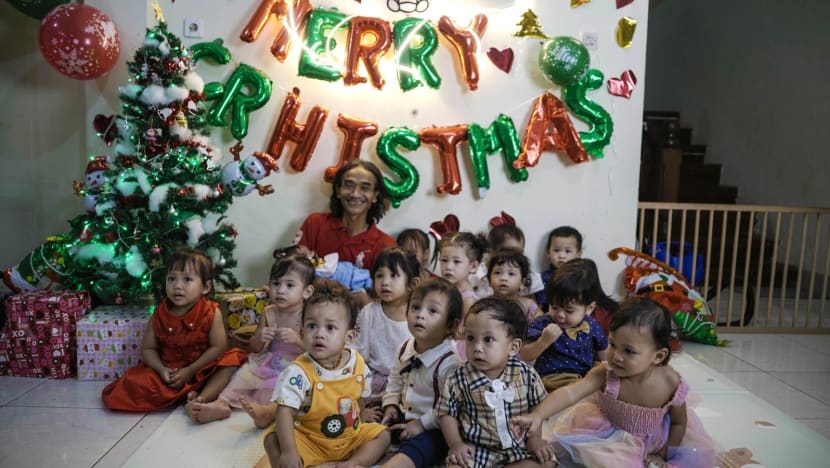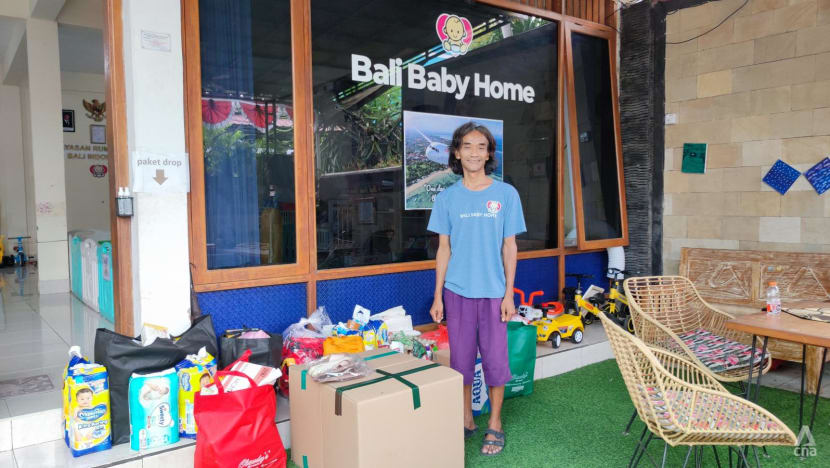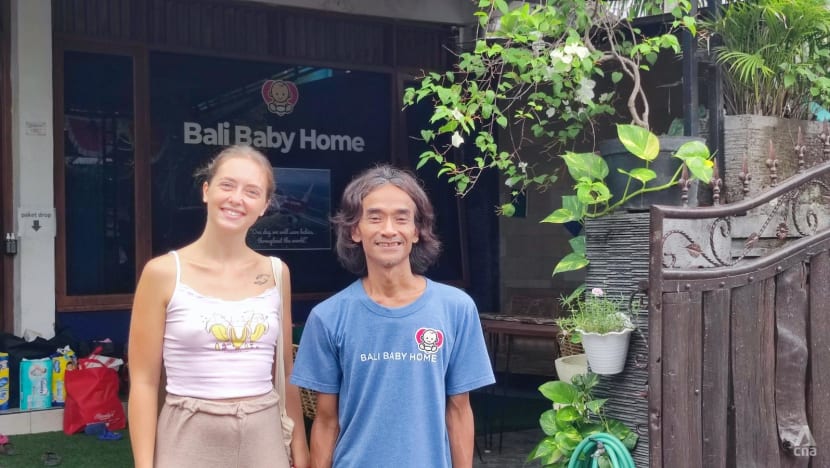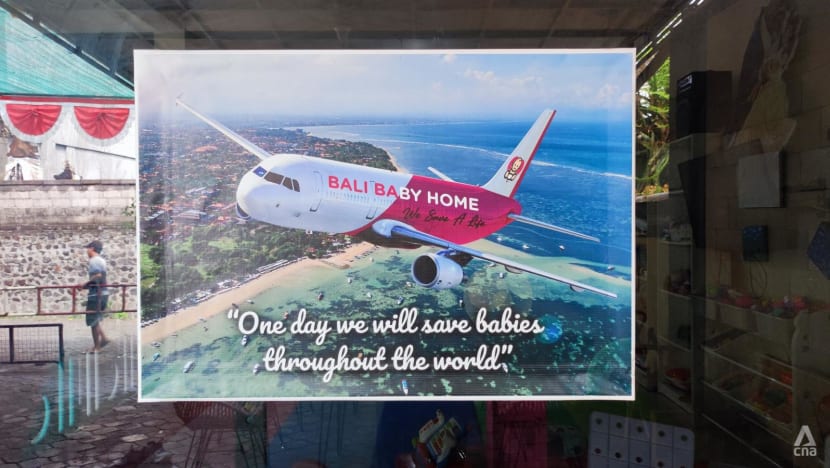Advertisement
For every 10 babies abandoned in Indonesia, only two survive.

Bali Baby Home – located in Gianyar regency in Bali – serves as a refuge for babies that Burhan Sugiarto and his team have saved from abandonment. (Photo: Bali Baby Home)
New: You can now listen to articles. 
This audio is generated by an AI tool.

24 Dec 2024 06:00AM
GIANYAR, Bali: As the year-end holiday season draws near, workers at one welfare home in Bali began putting up a Christmas tree and fairy lights to bring some festive cheer to its residents: Abandoned babies and unwed mothers.
“We fulfil each child’s spiritual needs based on the mother’s religion, including for those who are Christians, so indeed every year we have a Christmas celebration,” said Burhan Sugiarto, the founder of Bali Baby Home.
The welfare home – located in Gianyar regency and far from the bustling party-centric Kuta district that Bali is known for – serves as a refuge for babies that Burhan and his team have saved from abandonment. It also seeks to protect at-risk women who are facing unwanted pregnancies.
Burhan, 47, has a clear mission: To give every child, whether born or unborn, the opportunity to reunite with their family.
“Bali Baby Home is about prevention,” he told CNA, referring to his commitment to prevent the abandonment of babies and protect mothers in need or facing unwanted pregnancies.
“We don’t focus on adoption, our aim is to save and (eventually) reunite children with their birth mothers. I want to protect the child’s and the mother’s rights.”
Today, Bali Baby Home cares for around 30 babies, all under the age of three. Burhan also established two similar homes in Semarang and Yogyakarta. In total, these three welfare homes have cared for around 100 babies since their inception.
Of the over 100 babies, about 30 per cent of them have been reunited with their respective families.
Meanwhile, the latest data from the Indonesian Child Protection Commission found that there were 192 cases of abandoned babies reported in 2023 alone. The actual number, however, is estimated to be much higher as many cases go unreported.
Tragically, 80 per cent of these abandoned babies are found dead. This means that for every 10 babies discovered, only two are likely to survive.
Thus, Burhan told CNA that through Bali Baby Home, he strives to offer a lifeline to babies at risk of becoming part of that 80 per cent, by giving them a chance at life.
“FOUND IN THE JUNGLES, RENTAL APARTMENTS AND EVEN HIGHWAYS”
Burhan – a former tour guide in Bali fluent in French – made a life-changing decision in 2019 to pursue his dream to protect unwanted babies and support at-risk women facing challenges in raising their children.
His journey began through word of mouth but his efforts were hampered by the COVID-19 pandemic. It was not until Feb 28, 2022 that the Bali Baby Home he founded welcomed its first child.
“We have rescued babies from jungles, rental apartments and even highways. Had we arrived even a bit later, their lives could have been in serious danger,” Burhan said.
He also recalled an instance where he was alerted to a mother’s plan to abandon her baby along a toll road. Burhan mobilised his team quickly and within 30 minutes, they were able to save the baby and help the distressed woman.
“She (the mother) was carrying the baby and she kept crying,” Burhan said.
“If a baby cries, that’s normal. But if the mother cries, it means she’s stressed and that is a dangerous situation.”
Burhan believes that the high rate of baby dumping in Indonesia is partially due to the strict laws governing abortion in the country and the lack of comprehensive sexuality education.
In Indonesia, also the world’s most populous Muslim country, abortion is illegal except in cases of medical emergencies and rape.
A report by the National Population and Family Planning Agency estimated that there are 2.4 million cases of abortions annually in the country and as many as 700,000 – or about 30 per cent – of these cases involve teenagers.
In addition to providing a safe haven for abandoned babies, Burhan also helps women facing mental health challenges and those experiencing unwanted pregnancies, regardless of their marital status. Together with his dedicated team, he ensures that these women receive care and support until they give birth.
He said that many of these women face rejection from their families, who are often unwilling to accept the babies.
“We want to return the child to the mother but families often express embarrassment, saying things like ‘while we accept the mother, we do not accept the child’,” said Burhan, who was first featured in a series on everyday heroes on CNA’s Bahasa Indonesia site.
Other stories in the series include a man who has worked to tackle waste disposal issues at a city in West Java province as well as an animal lover who has been feeding and looking out for stray felines.

OUTPOURING OF SUPPORT FROM BALI COMMUNITY, TOURISTS
Each day, Bali Baby Home welcomes guests and volunteers who contribute donations and spend time interacting with the babies under Burhan’s care.
When CNA visited the welfare home in November, essential items such as eggs, diapers and other necessities were already lined up neatly at the entrance.
Around 15 volunteers were also present, playing with the babies.
One of them was Maria Costa, a 26-year-old psychology graduate from Argentina who came to Bali to gain experience from caring for the babies at the welfare home. She had heard about Bali Baby Home through Worldpackers – an app that connects people to volunteering opportunities.

“I thought I would feel sad coming here but after I came and saw the babies smiling and loving each other so much, it was very fulfilling,” said Costa, who previously worked with the Spanish Red Cross.
“I love them so much, they even know my name now and it is so heartwarming.”
Burhan regarded the role of volunteers and donors like Costa to be crucial in sustaining Bali Baby Home, adding that the support of the locals and foreign tourists have been “extraordinary” for him.
“Initially, I planned to fund (the welfare home) myself but after we rescued 10 babies, I couldn’t afford to use my own money,” he said.
“I started borrowing money but my friends proposed to organise open visits to inform the community and many came to support us ever since.”
Besides volunteers, Burhan also has 33 staff members helping him across the three welfare homes in Bali, Semarang and Yogyakarta.
“I didn’t know how I could keep going when I only slept two to three hours per day. (For example) just as I was about to sleep, a baby would cry and I would have to make some milk, change his diapers … That was my life every day.”
“When I realised I couldn’t handle it on my own, I started (hiring) employees,” he said.
Burhan, who now also runs an IT business, said that income from his entrepreneurial endeavour goes towards supporting the three welfare homes.
“More people are helping us now. I haven’t borrowed money for almost eight months. Things are improving. I don’t take up new loans anymore and I am very grateful,” he said.
RECOGNITION OF HIS EFFORTS
Burhan’s efforts to save the nation’s children have been recognised by the Indonesian Child Protection Commission (KPAI).
Last year, Bali Baby Home received the 2023 KPAI Award in the category of Community Institutions that Care for Children.
Burhan however confessed that he still has bigger dreams, one of which is to open more welfare homes in different provinces.
He told CNA that several provinces, including South Kalimantan, have reached out to him with requests to establish a welfare home in their area.
“Moving forward, I hope that more people are aware of this issue,” Burhan said, referring to the scourge of baby abandonment.
Burhan said that he was inspired by both of his parents to serve the community. His dad was a village head in Jatinom, Klaten in Central Java while his mother worked as a teacher.
“If there are residents without food, it’s the responsibility of the village head (to help them). My family and I would make sure to distribute rice to those in need,” he said.
“I was taught like that since young, it’s nothing new. So doing good has been instilled in me by my parents.”

The values instilled by his parents have influenced him to give back, as a way of expressing gratitude.
“Indeed, they (the babies) may have been unwanted but they are God’s gifts to me,” Burhan said.
“And this is an opportunity for me to raise them into valuable members of society that can lead fulfilling, happy lives.”
He remains hopeful for a better future where his welfare home is no longer needed and no baby faces abandonment.
“My utopian dream is for Bali Baby Home to close its doors because there will be no more babies in danger or risk being abandoned. That would be a dream come true,” said Burhan.
